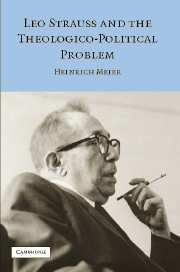Leo Strauss and Islamic Political Thought
In this book, Rasoul Namazi offers the first in-depth study of Leo Strauss' writings on Islamic political thought, a topic that interested Strauss over the course of his career. Namazi's volume focuses on several important studies by Strauss on Islamic thought. He critically analyzes Strauss's notes on Averroes' commentary on Plato's Republic and also proposes an interpretation of Strauss' theologico-political notes on the Arabian Nights. Namazi also interprets Strauss' essay on Alfarabi's enigmatic treatise, The Philosophy of Plato and provides a detailed commentary on his complex essay devoted to Alfarabi's summary of Plato's Laws. Based on previously unpublished material from Strauss' papers, Namazi's volume provides new insights into Strauss' reflections on religion, philosophy, and politics, and their relationship to wisdom, persecution, divine law, and unbelief in the works of key Muslim thinkers. His work presents Strauss as one of the most innovative historians and scholars of Islamic thought of all time.
- Provides the first comprehensive introduction to Leo Strauss's writings on Islamic thought
- Contains a significant amount of previously unpublished materials from Leo Strauss's papers
- Presents Leo Strauss as one of the most innovative historians of Islamic thought to a new audience working in the field of Islamic studies
Reviews & endorsements
‘Rasoul Namazi’s excellent study is written in an English style superior to that of most native speakers. His careful, focused, and thoughtful examination of Strauss’s writing on Islamic thought could very easily inspire other valuable books, such as Strauss on Hobbes, Spinoza, Locke, and the Founding of Modern Liberalism or Strauss on French Political Philosophy, from Montaigne to Rousseau.’ Alexander Orwin, Louisiana State University
‘Namazi’s work is a signal scholarly contribution that gives Strauss’s writings on Islamic thinkers … an important place in his work.’ Jeffrey A. Bernstein, College of Holy Cross
‘This book is a wonderful tour through, well, Leo Strauss’s reading of medieval Islamic political philosophy (as well as, or including, the Arabian Nights) and much of the secondary literature surrounding both the reception of Strauss’s ideas and methods and the obstruction of such a reception on the part of mainstream historical and philological scholarship. One of the many great virtues and contributions of Namazi’s book is that it resists the traditional insularity of Straussian and non-Straussian schools alike, seeking to read with an open mind non- and anti-Straussian scholars while modestly yet confidently making a case for why non-Straussians should read Strauss on Islamic political philosophy.’ Andrew F. March, The Review of Politics
‘An awareness of the controversy surrounding Strauss pervades Namazi’s work. His apologia is a labor of love: erudite, painstaking, uncompromising. Namazi highlights Strauss’s contribution to Islamic political thought and argues for the continued relevance of the Straussian approach. There is much to recommend in the book …’ Mahmoud Youness, The Review of Politics
‘… patient and perceptive readings …’ Beau Shaw, The Review of Politics
‘The two distinct audiences Namazi identifies for his book are those interested in either Strauss or medieval Islamic philosophy. But his engrossing study of Strauss’s engagement with Islamic political thought carries value for a wider audience beyond these specializations. Considering Strauss’s engagement with medieval Islamic philosophy raises questions of significance regarding the relationship between European and Islamic thought. Namazi does not raise these questions directly, but this thoughtful study is valuable for those looking to understand and delineate the distinctiveness of European thought.’ Humeira Iqtidar, The Review of Politics
‘A very stimulating and suggestive study that presents, through Leo Strauss’s writings, the interface of medieval Islamic thought and the discontents of modern political philosophy in a thoroughly enjoyable fashion. A boon for every student and lover of Islamic philosophy. … indispensable.’ S. Parvez Manzoor, The Muslim World Book Review
Product details
November 2023Paperback
9781009101936
290 pages
228 × 152 × 18 mm
0.46kg
Available
Table of Contents
- 1. Averroes between platonic philosophy and the Sharīʻa
- 2. Politics, religion, and love: How Leo Strauss read the Arabian Nights
- 3. From Alfarabi's Plato to Strauss's Alfarabi
- 4. Strauss, Alfarabi, and Plato's Laws.



